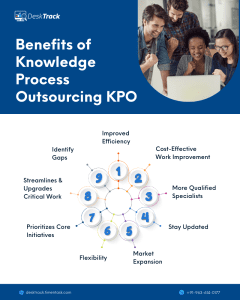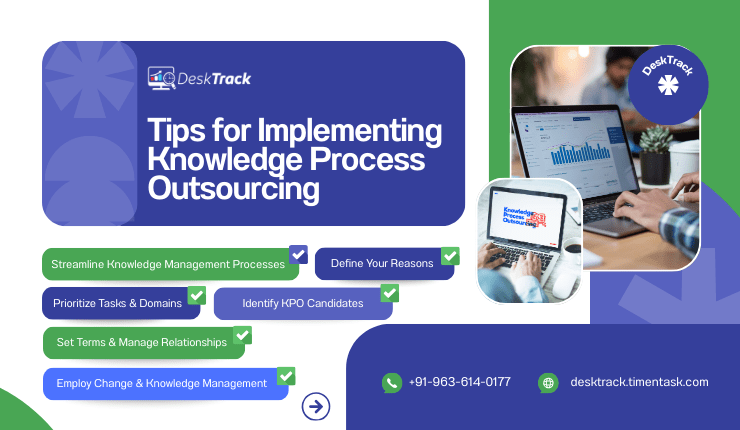Taking advantage of data is your whole and sole means for making successful business decisions. However, reality tells a different story. You might have large volumes of data and insights collected, but with your teams set to achieve so many goals with lots of information to search and filter, it’s much harder than you think. So, what can you do? Your solution is knowledge process outsourcing, or simply known as KPO.
What is Knowledge Process Outsourcing?

In layman’s terms, KPO is hiring outside help for business activities that you don’t think are important enough for you, but are still a big part of your business. As the name suggests, these people you hire have specialized knowledge, expertise, and experience in the work they are supposed to do for you.
Read Also: Improve Employee Engagement: 10 Proven Strategies that Work
Common Examples of Knowledge Process Outsourcing KPO Services
Make your workday more productive
Time tracking and work management can help you reach your goals
faster.
Commonly, businesses opt for knowledge process outsourcing KPO services where the work is around handling lots of data. Here are a few KPO examples for added transparency.
1. Data Analytics & Interpretation
As we mentioned before, businesses have lots of data to analyze and interpret. However, they commonly lack the time for this task. So, they hire experts to evaluate organizational data and extract useful information.
2. Market Research
Market research requires specialized expertise. Although businesses have their own teams for it, or project teams can also research the market, they are usually not good enough. So, to be on the safe side, they outsource market research experts to identify the current market trends.
3. Financial Consulting
Managing finances is a key aspect of running a business. Here, if you are even off by $1, then, let’s say, the entire payroll process will halt. So, contacting KPO service providers is the smart choice here as they have all the financial expertise you need. Besides, the final decision is still in your hands.
4. Management Consulting
Management brings together everything else that is a part of your business. However, sometimes, your management also needs expert help. That’s where outsourcing management consulting becomes necessary.
5. Advanced Data Entry & Management
Advanced data entry and management has the word advanced in it. Plus, it also involves data. KPO service providers in this field help businesses a lot by handling complex data with expertise.
6. Legal Process Outsourcing LPO
Running a business also involves a lot of interactions with the law. Strict compliance with labor and government guidelines is mandatory at all times. Although you have legal teams, legal process outsourcing is the better choice here.
Benefits of Knowledge Process Outsourcing KPO

Outsourcing knowledge and expertise to work for you has many benefits for your business. Here are the 9 advantages we got from availing knowledge process outsourcing in America.
1. Improved Efficiency
KPO professionals are specialized experts in their field. So, when they work for you, you will surely get a work efficiency boost. Plus, with insights from your employees, these people can provide better outputs to you.
2. Cost-Effective Work Improvement
Knowledge process outsourcing KPO services are available at competitive prices. So, whether you are a small, medium, or large business owner, you will always find what you are looking for at affordable rates.
3. More Qualified Specialists
Outsourcing work also earns you qualified specialists for the job. In simple words, only they can do the work that no one else can in your organization. Plus, this specialization also gets you useful insights regarding how you can do a specific task better.
4. Stay Updated
Outsourcing expert people to do the job for you also ensures that you stay updated with the latest changes in the market. Plus, you also stay up to date with the latest trends and demands.
5. Market Expansion
Hiring specialized experts on contract helps you tap into new markets and expand faster. Every outsourced worker brings particular knowledge about market trends and demands with them, helping you gain useful insights and grow.
6. Flexibility
Since outsourcing employees is cost-effective, it’s also flexible. According to your requirements, you can flexibly hire only the experts you need at that moment.
7. Prioritizes Core Initiatives
Outsourcing workers also ensures that work stays aligned with the vision of your organization. Since these experts have nothing to do with the incentives you provide, handovers, and other additional things, they work while keeping your goals in mind.
8. Streamlines & Upgrades Critical Work
With a specialized expert in every department, you can expect more streamlined workflows due to the right guidance and support being provided at every stage. Especially when you need to get critical work done.
9. Identify Gaps
With insights from the knowledge process outsourcing market employees, identifying project leaks and gaps becomes much easier due to specific input on what the issue is. However, a better way to identify gaps is to use the right project management software.
Limitations of Knowledge Process Outsourcing KPO
Hiring people from knowledge process outsourcing companies also comes with disadvantages, which you need to balance before making a decision. Fortunately, there are only 4 limitations.
1. Security Concerns
Outsourced employees can be a huge threat to your data’s security. Since you didn’t directly hire them, trusting them like your regular employees can be a big mistake. Because you will never know one of them might be working for a competitor and is only in your organization to steal your secrets. Although KPO service providers do a background check, you cannot be 100% sure.
2. Communication Problems
Communicating with outsourced employees is a big challenge. Plus, in case of any major problems, reaching out to the provider is also difficult.
3. Lack of Quality Control
Similarly, outsourced employees are only there for you till the job is done. Since they are experts, they work according to what they know is right. Thus, you have no quality control.
4. Demoralizes Consumers & Employees
Imagine how you would feel if someone else received a salary for your work. That’s exactly how your employees feel when you outsource others for their work. In such cases, employees think that you don’t trust them, and they have a lower value in your organization than outsiders. The question they ask is, then, what am I here for? Similarly, some consumers may also feel betrayed because they hired you for the job and not others.
Read Also: Top 10 KPI Tracking Software for Businesses
Tips for Implementing Knowledge Process Outsourcing

So, now we know that you have balanced the limitations of knowledge process outsourcing KPO for your business. Finally, to implement knowledge process outsourcing in your organization, you need a process. Here are some useful tips that worked for us.
1. Streamline Knowledge Management Processes
First, you need to optimize the processes you have for managing your information, data, and expertise. This will help you identify gaps that you need to fill with outsourced workers.
2. Define Your Reasons
Secondly, you need to know why and where you need KPO service providers. Otherwise, it will only be time-wasting, unnecessary hiring.
3. Prioritize Tasks & Domains
Next, what we will do is put the tasks and fields we want to work on as high priority. Your focus should be on this work only.
4. Identify KPO Candidates
Once you have the work down, you need to identify the right employees to outsource to do the job. There are several ways for knowledge process outsourcing in America, including finding online candidates, visiting KPO service providers, or via a mediator.
5. Set Terms & Manage Relationships
Once you have the right people for the job, you need to treat them like your regular employees and set the terms and conditions of their work and pay. Plus, you also need to have a strong bond with the outsourced HR, as this will increase your chances of working together again in the future.
6. Employ Change & Knowledge Management
Knowledge process outsourcing KPO will bring change in your business. For example, retaliation from employees. So, you need to prepare yourself for this change and help your HR and concerned people come to terms with it.
Real-Time Monitor All Outsourced Employees with DeskTrack
So, now you know all about it and have outsourced employees to do specific jobs for you. However, just like your regular employees, it’s also essential to monitor the help you are getting from anywhere else. Here’s how DeskTrack’s employee monitoring software solution helps.
- Screenshot Monitoring: Real-time screenshot monitoring helps you identify insider and outsider threats by identifying work trends and patterns. You will instantly know if something is fishy with a glance at the screenshot reports.
- Time Tracking: DeskTrack easily tracks and reports the time your employees spend on and off their systems while in your organization.
- Project Management with Secure Access: Easily manage project statuses, progress, and workflows from a user-friendly interface in real-time. The tool provides color-coded projects and tasks for easy understanding. Plus, every employee can only access the data that they are allowed to
- Real-Time App, URL & File Usage Monitoring: Know what app your employee is on at a given time. Mark it as productive or unproductive according to your requirements for efficient work quality control.
Other than that, the tool also provides attendance management and productivity monitoring with scalable features and functionality. Try now and realize how 8000+ organizations around the world have maximized their productivity with it.
Frequently Asked Questions (FAQ)
Q. What is Meant by Knowledge Process Outsourcing?
Ans. KPO is hiring outside help for business activities that you don’t think are important enough for you, but are still a big part of your business. As the name suggests, these people you hire have specialized knowledge, expertise, and experience in the work they are supposed to do for you.
Q. What is an Example of a KPO?
Ans. Here are a few KPO examples according to the services provided.
- Data Analytics & Interpretation
- Market Research
- Financial Consulting
- Management Consulting
- Advanced Data Entry & Management
- Legal Process Outsourcing LPO
Q. What are the Benefits of KPO for Businesses?
Ans. Hiring outsourced HR has several benefits for your business, including:
- Improved Efficiency
- Cost-Effective Work Improvement
- More Qualified Specialists
- Stay Updated
- Market Expansion
- Flexibility
- Prioritizes Core Initiatives
- Streamlines & Upgrades Critical Work
- Identify Gaps
Q. What is the Difference Between BPO & KPO?
Ans. Business process outsourcing, also known as BPO, focuses on repetitive and process-driven tasks. On the other hand, KPO, or knowledge process outsourcing, concentrates on outsourcing workers to get knowledge and data-driven work where expertise is required.
Q. What are Some Knowledge Process Outsourcing Companies?
Ans. Here are 6 of the top KPO service providers, shortlisted for you.
- Genpact
- TCS
- Infosys
- BPM
- Accenture
- Wipro


















